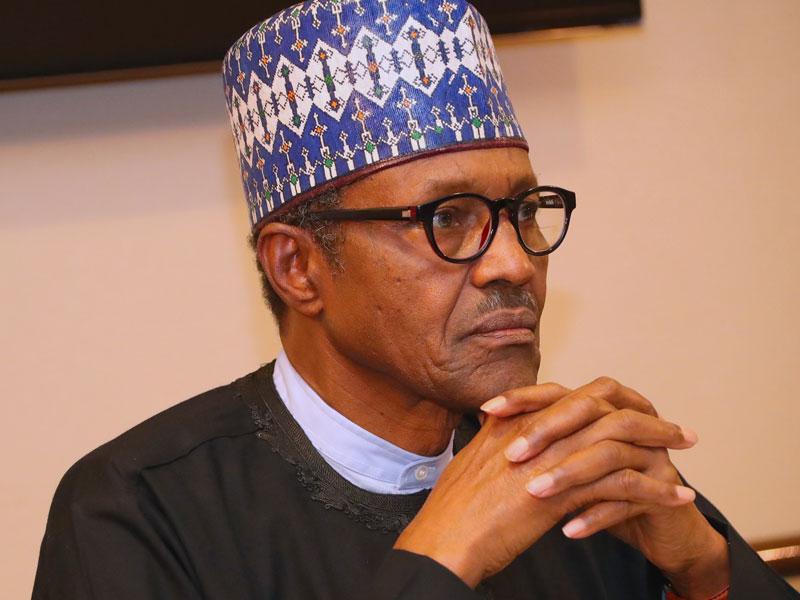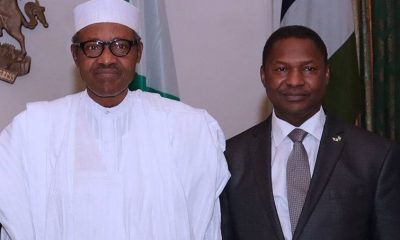Inside Nigeria
Workers’ Salaries To Be Renegotiated Downward ― Buhari

President Muhammadu Buhari on Wednesday disclosed that government anticipates that there will be a renegotiation of salaries of workers earning above the proposed national new minimum wage after the new structure is passed into law.
He made the declaration while inaugurating the Presidential Advisory Committee on New National Minimum Wage, at the Council Chambers, at the presidential villa, Abuja.
Bismarck Rewane, a financial and economic expert is chairman of the committee.
President Buhari said: “I want to make it clear that there is no question about whether the National Minimum Wage will be reviewed upwards. I am committed to a review of the Minimum Wage.
“Also, it is important to explain that even though the subject of a National Minimum Wage is in the Exclusive Legislative List, we have been meeting with the State Governors because it is imperative that the Federal Government carries the State Governments along in determining an upward review of the minimum wage for workers.
“This is especially necessary considering the prevailing public sector revenue challenges, which have made it extremely difficult for some of the governments to pay workers as and when due.
“As you know we, at the Federal level, have made adequate provision for the increase in the Minimum Wage in our 2019 Budget proposals which we submitted to the National Assembly. Therefore, we will be able to meet the additional costs that will be incurred in moving up all personnel who are currently earning below the new minimum wage.
“However, we anticipate that after the new minimum wage has been passed into law we will be going into negotiations for salary review for all the workers who are already earning above the new minimum wage. It is therefore important that we are properly prepared to meet these demands.
“We must, therefore, look at ways of implementing these consequential wage adjustments in a manner that does not have adverse effects on our national development plans, as laid out in the Economic Recovery and Growth Plan (ERGP). The ERGP sets appropriate targets for levels of Capital Expenditure, Public Debt, Inflation, Employment, etc. It is absolutely important that the implementation of a new minimum wage does not adversely affect these targets, and thereby erode the envisaged gains for the workers.
“It is against this background that I have set up a Technical Committee to advise Government on how best to fund, in a sustained manner, the additional costs that will arise from the implementation of the consequential increases in salaries and allowances for workers currently earning above the new minimum wage.”
The inauguration took place shortly before the commencement of the first Federal Executive Council (FEC) meeting for the year.
Members of the committee drawn from the private sector include former Chairman of the Federal Inland Revenue Service (FIRS), Mrs Ifueko Omoigui-Okauru, Sulieman Barry, Dr Ayo Teriba, and Prof. Akpan Ekpo.
From the public sector are Chairman FIRS, Dr Babatunde Fowler, Director General of Budget Office, Ben Akabueze, who is the secretary of the committee, representative of the Nigeria Governors Forum (NGF), Chairman of the National Salaries, Incomes and Wages Commission, Richard Egbule, Permanent Secretary, Service Welfare Office of the Head of Service of the Federation, Mrs Didi Walson-Jack, Permanent Secretary General Service Office, Office of the Secretary to the Government of the Federation, Olusegun Adekunle, Permanent Secretary Ministry of Finance, Dr Mahmoud Isa-Dutse, Permanent Secretary Ministry of Budget and National Planning, Olajide Odewale, Permanent Secretary Ministry of Labour Mrs Ibukun Odusote, and Solicitor General Of the Federation and Permanent Secretary ministry of Justice Mr Dayo Apata.
Others are Special Adviser to the President on Economic Matters, office of the Vice President, Dr Adeyemi Dipeolu, Deputy Governor of the Central Bank of Nigeria, Economic Policy Dr. Joseph Nnanna, Accountant General of the Federation, Ahmed Idris, Director General Debt Management Officer, Ms. Patience Oniaga, Director General National Institute of Social and Economic Research, Dr Folarin Gbadebo-Smith, Statistician General, National Bureau of Statistics, Dr. Yemi Kale, Mrs. Aisha Hamad, Mamman Garba and Tunde Lawal.
Buhari, who describes members of the committee as “experienced economists and administrators” from the private sector working together with all the relevant officials in the Government, listed four terms of reference of the committee.
They are: To develop, and advise government on how to successfully bring about a smooth implementation of impending wage increases; Identify new revenue sources, as well as areas of existing expenditure from where some savings could be made in order to fund the wage increases without adversely impacting the nation’s development goals as set out in the Economic Recovery and Growth Plan; Propose a work plan and modalities for the implementation of the salary increases; and Any other suggestions that will assist in the implementation of this, and future wage increases.”
The President said given the urgency of the exercise, the Committee is expected to complete its deliberations and submit its report and recommendations within one month.
Meanwhile, the Minister of State for Foreign Affairs, Khadija Bukar Abba Ibrahim, has resigned her appointment to contest the seat of Damaturu/Tarmuwa/Gujba/Gulani federal constituency of Yobe State in the February 16, 2019 election.
With this action, she becomes the sixth minister to resign from the President Buhari cabinet.
She confirmed to some State House Correspondents that Wednesday’s Federal Executive Council (FEC) meeting was going to be her last, shortly before the commencement of the meeting.
Others who had gone before her from the government are Amina Mohammed, Ibrahim Jubril, Kayode Fayemi, Kemi Adeosun, and Senator Aisha Alhassan.











